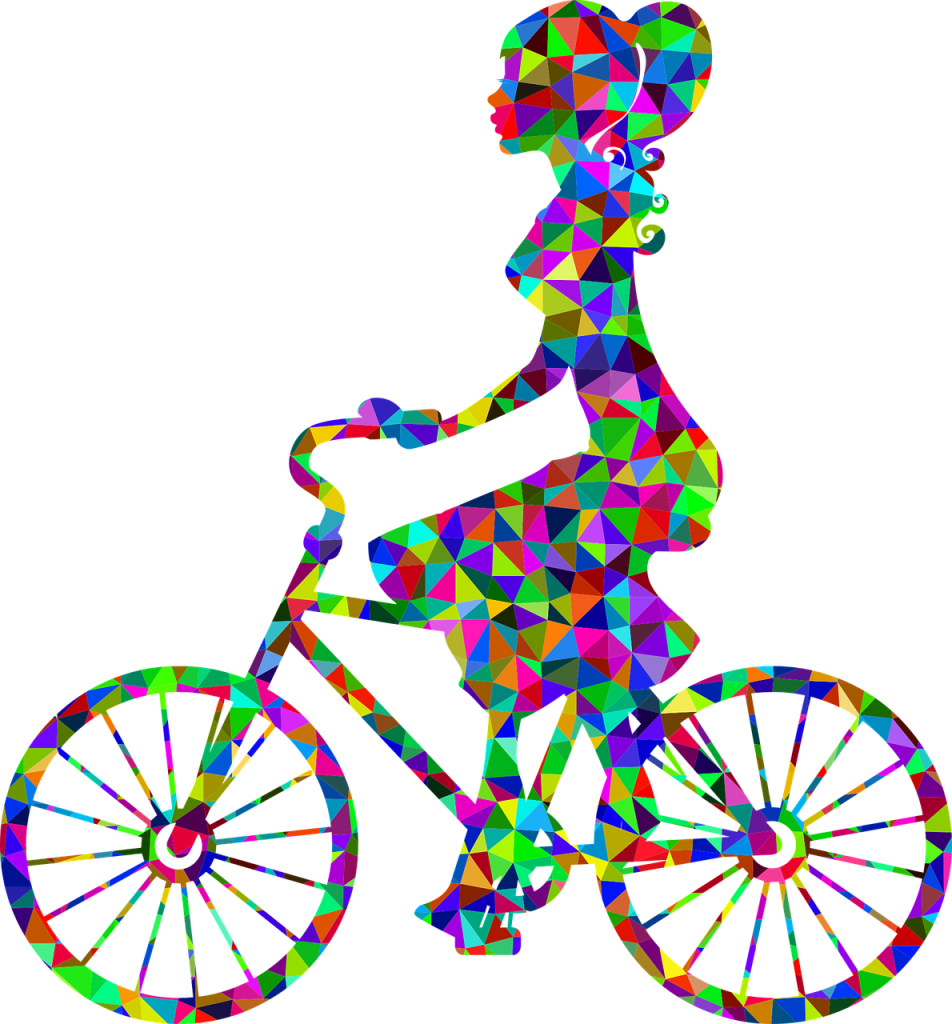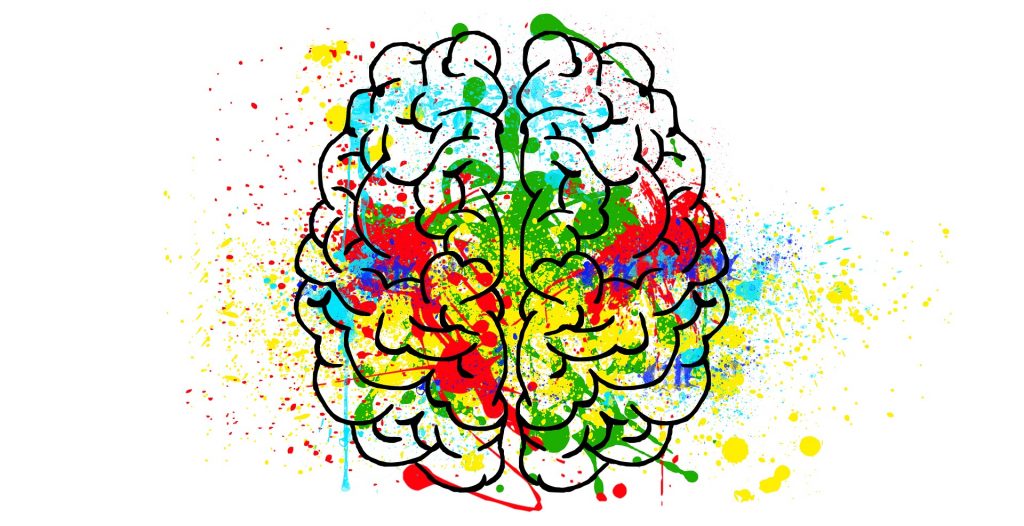I have spent my entire life feeling as if I don’t fit in, like I don’t belong. Other people have always seemed like a mystery, especially in the effortless way they navigate the twisted path of social interaction. As a child I thought this would change as I became an adult, that I would suddenly learn to ‘be like everybody else’. But it didn’t. Nevertheless, I’ve always managed pretty well, compensating in a variety of ways: drifting off into my own world, sticking to subjects I know (avoiding those I don’t), or by finding the alternative music scene and embracing my place as an outsider (one of the more successful strategies, although I never felt I fit in there either). Even now I prepare myself for potential conversations by preparing answers to the common kind of ‘small talk’: ‘what did you do over the weekend?’, ‘how are the kids?’ – that kind of thing. In the past, forgetting to do this could result in a long-lasting, sometimes debilitating, state of anxiety, as could a whole host of other seemingly innocuous situations. Then in 2019, after years of cognitive behaviour therapy, counselling, medication, and a pervasive sense of confusion, I was diagnosed as having Level 1 Autistic Spectrum Disorder (ASD). Suddenly I had a framework in which my experiences made sense. My preference to play alone as a child, the gullibility that I spent years trying to overcome or those social difficulties I have experienced as an adult.

People often ask what point there is in ‘having a label’. I can’t speak for anybody else, but my life has become immeasurably easier. I still need to prepare myself for small talk but knowing that this is because of my neurodevelopmental differences, rather than stubborn habits to be fixed, has significantly reduced my anxiety. This is true of many aspects of my life.

The National Autistic Society says that ‘Autism is a lifelong developmental disability which affects how people communicate and interact with the world’. Autism isn’t one, easily definable, condition, but rather a ‘spectrum of closely related disorders with a shared core of symptoms’. The definition of autism has changed over the decades and is likely to change some more (not all that long ago I would have been diagnosed as having Asperger’s Syndrome, and while this remains in common usage, it has now been diagnostically incorporated into the umbrella term ASD). While most of these changes have been made to make diagnosing a complicated range of overlapping conditions easier, it has caused some confusion in the general public and exacerbated various misunderstandings, such as the often heard ‘everybody is on the spectrum’, which mistakenly frames the spectrum as a gradient on which everybody falls, ranging from ‘mild’ to ‘severe’. In fact, the spectrum is a complex range of symptoms, of which a certain amount, in specific combinations, must be present for a diagnosis to be made. Everybody has some traits that exist on the spectrum, but that does not make everybody ‘a little bit autistic’. A bicycle is a mode of transport that uses wheels to facilitate motion; a trait it shares with a motor car, but I’ve never heard anyone say that a bicycle is ‘a little bit car’.
The spectrum of autistic traits can be categorised into three broad categories:
Social and Communication Difficulties.
For me these include:
- Taking things too literally.
- Difficulty processing verbal information. For instance, I often experience a ‘lag’ between hearing words spoken to me and understanding them. Consequently, there is sometimes a noticeably extended pause before I respond. I can also become ‘overloaded’ if I am in a conversation with too many people.
- Misunderstanding social cues. For example, colleagues have commented about my habit of walking away before a conversation has finished.
- Not having many close friends (please don’t feel sorry for me, that’s how I like it).
Repetitive and Restrictive Behaviour.
For me these include:
- Repeatedly tapping each finger against my thumb, in sequence (I also rock back and forth).
- Unconsciously rubbing my belly when talking to people. I eventually learnt to stop after it became something of a running joke at work.
- Difficulties when routines are disrupted – if someone turns up at my house unannounced then I am thrown into a kind of daze where I find it especially hard to concentrate on social interaction. Changes at work, such as being moved to a new team, can cause me long-running anxiety – even if I know the team members well.
- A paradoxical aversion to developing routines, because of how they affect me. This makes me rather disorganised and resistant to being organised by others.
Over or Under Sensitivity to Light, Sound, Taste and Touch.
For me these include:
- Over-sensitivity to labels in clothes. Some cause me to feel small ‘electric shocks’ that shoot down the length of my body.
- Over sensitivity to certain seams in socks. Especially if they touch the tops of my toes, which can be painfully sensitive.
- Experiencing Autonomous Sensory Meridian Response (ASMR) which is: ‘the sensation experienced by some people in response to specific sights and sounds, described as a warm, tingling and pleasant sensation starting at the crown of the head and spreading down the body’.

Recently, I’ve been reading, Iain McGilchrist’s (psychiatrist, writer, and Patron of the Middle Way Society) The Master and His Emissary; a book which ‘argues that the division of the brain into two hemispheres is essential to human existence, making possible incompatible versions of the world, with quite different priorities and values’ (for those unfamiliar with McGilchrist’s seminal work, Robert M. Ellis has produced a fine summary and review here). It became apparent to me, as I read that autism shares many traits with left-hemisphere activity, and therefore appears to be a ‘left-brain’ condition. People with a diagnosis of ASD tend to function better in familiar situations, they are often more inclined to divide the world (and the things in it) into categories or type, and can have, or appear to have, superficial emotions. They often struggle to view the ‘bigger picture’, understand implicit metaphorical language, or maintain complex social relationships. The list goes on.
However, the more I thought about it, the more I became convinced that, while the similarities must be more than coincidence, the relationship between the two is much more complicated. McGilchrist hints at this potential complexity in The Master and His Emissary, even if he does not discuss ASD in great detail. He suggests that, in relation to ‘some forms of autism and Asperger’s Syndrome’ there may be ‘a partial inversion of the standard [left-right brain hemisphere operational] pattern, leading to brain functions being lateralised in unconventional combinations’.
I have always struggled with metaphorical language – and while I have learnt to understand and use it in prose, much of the symbolism found in poetry is lost on me. I am also inclined to rigid thinking, and the emotions I feel tend to be relatively simplistic and superficial.
So far, so left-hemisphere.
But then there’s the fact that listening to music is one of the most important things in my life, and the experience of it transcends cognitive thought. I’ve never been overly interested in understanding the structure of a piece of music, and I’m not usually fussed by listening to lyrics (quite often I don’t even hear them but experience the voice as another instrument). It’s the embodied experience of listening that I crave. And while many of my emotions tend to be quite simple, I experience empathy in such a deep way that I sometimes joke it is pathological. All of which seems decidedly right-hemisphere.
My ASD diagnosis suggests that I require ‘little support’ with my day-to-day living, which is largely true. Therefore, it might be assumed that these apparent right-hemisphere anomalies are specific to me. That they are only present because my autism is ‘mild’. This, however, doesn’t seem to be the case
There is a growing body of research which suggests that many children with autism, some of which have very limited communication skills, respond remarkably well to music, and through it are better able to express their emotions to others. It has also been shown to help facilitate the acquisition of language in those who did not previously demonstrate it (those who have read The Master and His Emissary will recall the significance of this to a part of his thesis).

And while there is a wide-spread assumption that people with ASD do not have the ability to feel empathy, this, as my experience suggests, is also not necessarily the case. In fact, the very opposite may sometimes be true. According to The National Autistic Society:
“Autistic people can and do feel empathy. They can be more empathetic or emotionally aware than non-autistic people”.
I often have the sense that I feel empathy more acutely than those around me, sometimes feeling deep empathy for people whom others judge to be undeserving of it. For example, if a news report comes on the TV about a child that has been killed by a drunk driver, I experience deep empathy, concern, and sadness for all involved – including the driver. On occasions when I’ve mentioned this, I’ve noticed that people can become quite angry, as if I should choose where my empathy is directed. Of course, my deepest feelings are felt for the child and the child’s family, but I am also intuitively aware that the driver’s life has also been ruined because he or she has made one bad decision. I see no conflict in being resolute in my belief that the driver should be held responsible for their actions while also extending my empathy towards them. I don’t know why I respond this way because it is entirely involuntary. Perhaps it comes from a lifetime of learning to ‘read’ other people. Consciously trying to ‘put myself in their shoes’ so that I might understand them better. These are things that come naturally to most people at an early age but take significant and purposeful effort for someone with ASD. It could be a case of ‘practice makes perfect’ (not that I’m claiming perfection).
McGilchrist has yet to explore these issues in detail, although I believe he has hinted that he will explore them further in his next book. All I have been able to do here is reflect on the similarities I have noticed, relating them to my own experience, and to the recent thinking about aspects of ASD. Whether McGilchrist will reinforce my conclusions or not is unknown, but I eagerly await the chance to find out.
In terms of practising the Middle Way, autism comes with specific challenges: rigidity of thought, difficulties with metaphorical language, and other features common to left-hemisphere activity. There also seem to be traits that are obviously useful, such as a rich, embodied response to music, and a strong sense of empathy (be that instinctive or learnt).
Engagement with Middle Way Philosophy has enabled me to explore those aspects of my personality that seem like they could be barriers to it. In doing so, I’ve learnt to utilise those traits in increasingly helpful ways; by directing rigidity of thought towards avoiding dogmatic extremes, for example. On paper, it might seem that autism and the Middle Way are incompatible, as if the left-hemisphere has too firm a grip to allow meaningful progress, but this is not the case. If anything, they can complement each other. The things that make me autistic have created challenges, in life as in my pursuit of the Middle Way, yet they have also been beneficial and enriching. Being diagnosed with autism has helped me understand myself, the Middle Way has helped me understand my autism, and in turn autism has helped me embrace the Middle Way.
Image One by SplitShire. Image Two by giorgio9377. Image Three by GDJ. Image Four by ElisaRiva. All courtesy of Pixabay.

Hi Richard, here I am again, nearly a decade has flown by since I contributed Art Blogs to the The Middle Way Society Practice page! I was chatting this morning to a friend about Iain McGilchrist’s work on the divided brain, I decided to look up this page to refresh my memory and came your blog of 16 December. Firstly congratulations on your degree. My interest grew as I read on, four of my grandchildren were diagnosed as being on the ASD spectrum years ago, so I have an added reason to get back to you, thank you for your insight, so much is familiar territory.
I do wonder how you all are, I can imagine how scary your work environment must be with Covid-19 cases, I am lucky to have had the first Vaccine jab, the second will be in January.
Just thought I’d pop in virtually to say hello and wish you all a better 2021. Norma.
Hi Norma,
How lovely to hear from you – it’s definitely the best thing to happen so far this year! I’m glad you are well and am pleased that you have had the vaccine. Hopefully things will start to improve for people, although I worry that there is still an expectation that things will return to ‘normal’ faster than will actually be the case.
I’m glad you were able to relate to this blog, it’s by far the most personal thing I have written. I am taking less of a role in the society these days, mainly due to work and family commitments – which have especially been exacerbated with the current pandemic.
Work is becoming a bit more scary in terms of COVID – the cases in our hospital now exceed those of the first wave. However, we do feel more prepared and we also feel more confident working with the virus, in that we know more about it than we did before.
I look forward to hearing from you again and, who knows, perhaps we will be able to meet in person at some point in the not too distant future.
Rich.
Thank you for sharing this, it was a really interesting read. I can relate to a great deal of what you have written and I am also on a waiting list to be assessed for autism, at 30 years old, following a diagnosis of ADHD.
Hi Richard, are you still picking up comments on this post? I’m a (suspected) autistic woman currently reading The Master & His Emissary and I have some thoughts about autism and the LH/RH experience that I’d love to share with you…
Hi Sophie,
I’m so sorry for the delayed reply – it a bad habit that I have been trying to remedy for many years!
I would be very interested to hear thoughts about Autism in general, about your own experiences, and in relation to LH/RH processes.
Rich.
Hi Richard, I’ve only just picked up your reply, I’m so sorry! I’m going to meet Iain McGilchrist with Satish Kumar for a 5-day study residential at Dartington in October and would welcome the chance to speak to you before I go. My own feelings are that there’s much to be explored here and our understanding of autism and its many permutations & gifts is in its relative infancy.
I want to ask Iain his views on autistic empathy, autistic spirituality, and also warm data systems thinking and how that relates to LH/RH.
Speaking as a (highly likely) autistic woman (autistic father? & kids, I score 28/50 on the AQ50 and 75 on the RAADS-R).
But – I score above the NT average for empathy (so much it’s painful at times), have a deep interest in spiritual pathways, psychology and philosophy (especially around human social/community models) and often seem to see the wood first in this regard, not the trees!
I find myself completely agreeing with Iain that we must address the imbalance & have more RH approaches in modern culture. And weirdly, I had a similar rabbit hole going on privately (like an intuition), with a historical timeline similar to his, about 10 years before I came across the book.
For my part, I teach nature-based meditation & forest bathing and also work in regenerative design & architecture as a creative copywriter. I’ve always considered myself a bit of a Romantic (as in the historical meaning). Like McGilchrist, my academic subjects were English literature, ancient history & philosophy (although I’m interested in science too and come from a family of science academics on my dad’s side, arts academics on my mum’s).
So…in many ways I relate to ‘typical autistic’ LH patterns of thinking, but in other ways (as you can see) not at all. Perhaps quite ‘whole brained’ without trying to make myself out to be some sort of genius!
Is that perhaps an aspect of a particular sub-type of autism? Could McGilchrist be that way wired himself as a gifted LH/RH polymath? I’m thinking of Da Vinci and Einstein…two examples of very clever polymaths thought to be autistic? Einstein was a physicist of course, but I understand also deeply wise, intuitive & philosophical.
My thoughts are all speculation of course!
Perhaps we could talk or email? Thank you, Sophie
Hi Richard, sorry, I’ve only just seen your reply.
I’m going to study with Iain McGilchrist and Satish Kumar in October and I want to discuss autism while I’m there, so I’d welcome the opportunity to talk to you before I go.
I wrote a long comment here yesterday which seems to have vanished, but in summary my experience of autism is a decidedly ‘whole brained’ one and I’m especially interested in autistic empathy (I score much higher than what is considered NT), autistic spirituality, and warm data, symbiotic systems thinking for human-in-nature/regenerative communities…all things Iain talks about as being RH leanings.
I wonder if there’s a sub-type of level 1 autism which is almost a reverse of the typical super-rational LH type he talks about, a super-connected type that gives rise to autistic polymaths and creative thinkers? E.g. Da Vinci is one obvious example. (Not that I’m comparing myself to his genius of course!!) And wouldn’t it be ironic if McGilchrist displayed signs of those autistic polymath talents himself?
In my other comment I gave you more of a biography of our family’s autism, also my academic & professional interests which are all literary arts & humanities based…not dissimilar actually to Iain’s. Plus I hinted at a strange moment many years ago where I had an intuition/personal rabbit hole about the bicameral brain and western history…long before I’d heard of the book.
If you’d like to talk, I can expand on all of this. Best wishes, Sophie